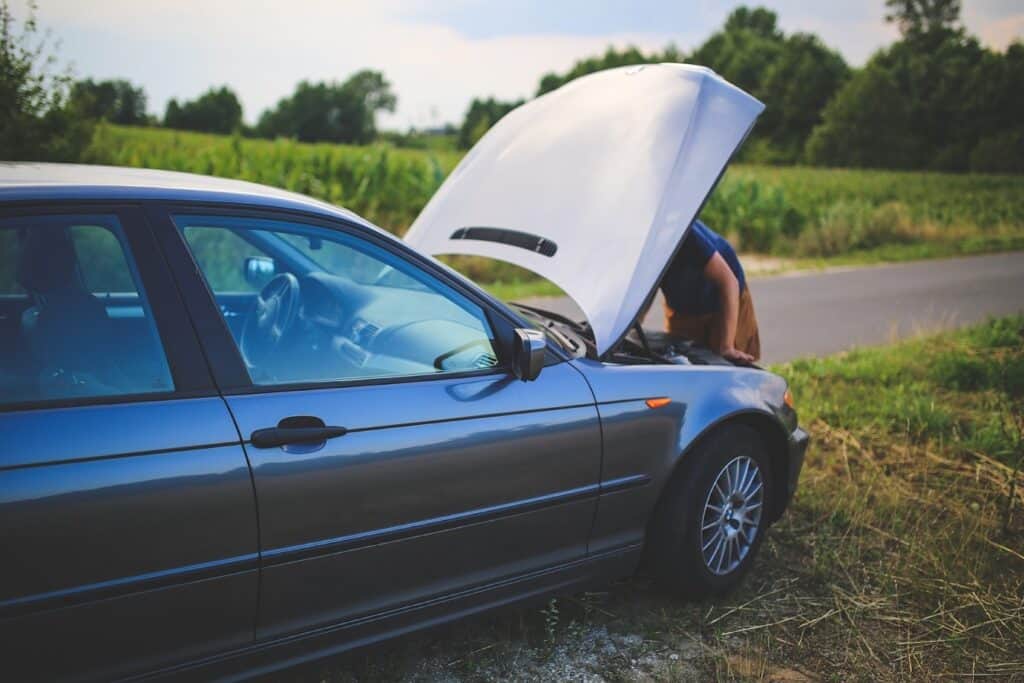Table of Contents
Ever found your car making an odd grinding noise when accelerating or cruising at low levels? It’s a situation that leaves many drivers scratching their heads. In this brief guide, we’ll unravel the reasons behind this peculiar sound and offer practical solutions in simple terms.
Curious about what’s causing the commotion? Most often, it boils down to trouble in either your transmission or brakes. We’ll break it down into easy-to-understand details, so you’re not left in the dark about what might be going on beneath the hood.
But wait, there’s more! We’ve tapped into the expertise of a trusted auto specialist who has shared valuable insights. Join us as we explore the reasons behind your car’s mysterious grinding noise and discover straightforward fixes to keep you on the road smoothly. Ready to get the lowdown? Let’s jump in!
What Does This Noise Mean?
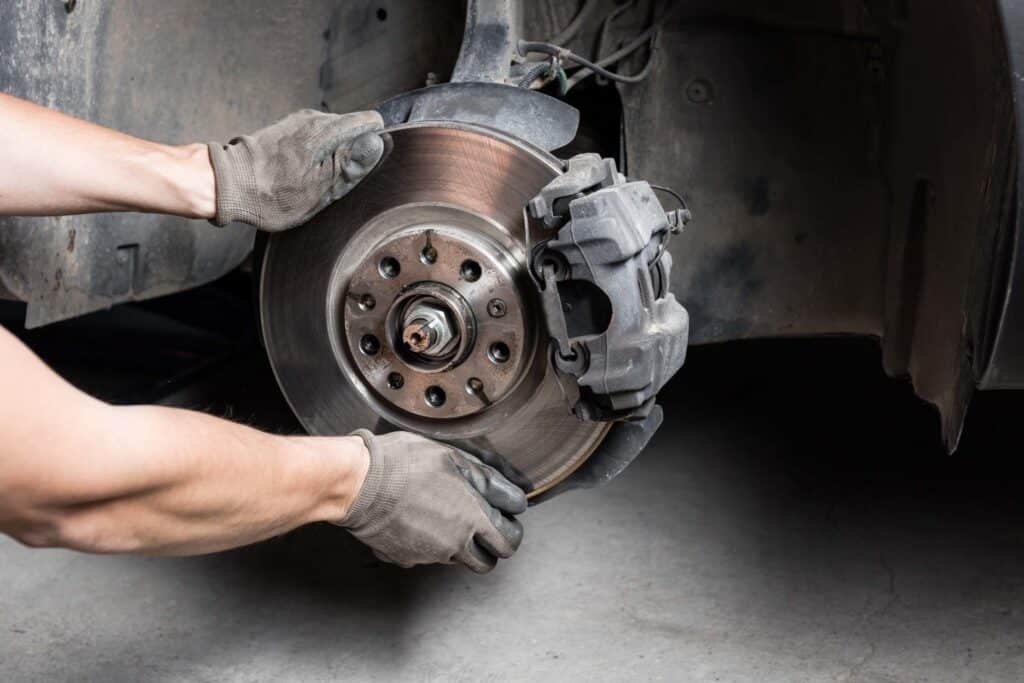
If your car is making a weird noise when you accelerate or go at a low speed, it means something’s wrong with a part. The noise is like a signal telling you to fix or change that part.
Figuring out what’s causing the noise isn’t easy just by listening. You have to look at other things your car is doing to find out the real problem.
People often think the noise is because of the brakes, but that’s not specific enough. You need to check other possibilities and see what else might be going wrong.
So, if your car makes a grinding noise when you’re accelerating at low speed or stopping, it’s like a puzzle. You have to look at all the pieces (possible causes) and match them up with other things your car is showing (other symptoms) to find out what’s broken and needs fixing.
Loud Squeaking or Squealing:
If your car makes a loud squeaky or squealing noise when you hit the gas, it might be the engine belt acting up. It could be loose, worn, or one of the pulleys it’s connected to might be acting funny.
Rumbling Noise:
A loud rumbling noise during acceleration could signal trouble with your exhaust system. There might be a leak causing the system to work extra hard to handle extra exhaust fumes.
Other Noises and What They Could Mean:
Grinding: If you hear a weird grinding sound while accelerating at low speed and shifting gears, your clutch or the whole transmission might be having issues. It’s best to see a mechanic.
Rattling: Rattling noises can be tricky since they could point to various problems. If it’s under the sell my car, something might be loose, like the exhaust or catalytic converter. Under the hood, it could be about oil levels or another component. If it’s inside the car, it’s likely just a loose item rolling around in your glove compartment or trunk.
Ticking: A strange ticking noise often means your car is low on oil. Pull over safely and check your oil levels. If they’re okay, the ticking might signal a more serious problem, so it’s time to see a mechanic.
It’s essential to pay attention to these sounds and get them checked by a professional to keep your car running smoothly.
Possible causes of a grinding noise on acceleration
- Transmission issues
- Differential issues
- Worn or failing wheel bearings
- Damaged or worn CV joints
- Damaged or loose engine/motor mounts
Transmission issues
Your car’s transmission plays a crucial role in regulating the power sent from the engine to each wheel. If you’re hearing a grinding noise when you accelerate, it’s probably linked to the planetary gear system in your car. This system ensures that the speed of your car’s wheels matches the speed of the engine.
When there’s a disparity in the speeds of your wheels and engine, causing the grinding noise while drive, it can lead to significant damage to your transmission. This grinding sound may be noticeable during acceleration or when your car is in a specific gear.

Regrettably, if the grinding is due to transmission issues, fixing it might not be an option—you’ll likely need to replace the entire transmission. Attempting to handle transmission repairs or replacements on your own is strongly discouraged. Transmissions are intricate and complex machines that require the expertise of professionals.
Understanding the source of the grinding noise while drive and addressing transmission problems promptly is essential to prevent further damage. Seek the assistance of a qualified mechanic to accurately diagnose the issue and determine the best course of action for your vehicle’s specific needs.
Differential issues
The differential is a crucial part of your drivetrain that enables your car’s wheels to move at different speeds. Without this capability, controlling your car would become unpredictable and hazardous.
In simple terms, the differential takes the power generated by the engine and distributes it to each wheel, allowing them to rotate at varying speeds. When the differential malfunctions, you might hear a whining sound.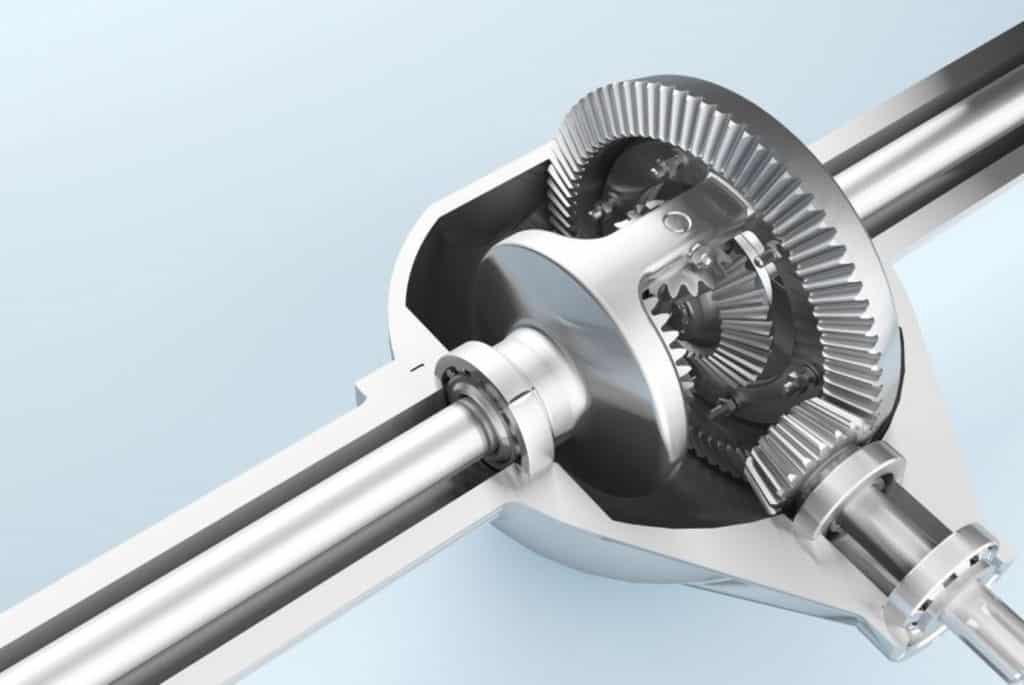
As the issue progresses, you may start experiencing grinding noises, especially during acceleration or turns. This suggests that the internal gears of the differential are worn and not functioning properly.
Unfortunately, if the problem has advanced to the grinding stage, you’ll likely need to replace the entire differential.
If the differential is only producing a whining noise, it could indicate a low level of differential fluid. This fluid serves as lubrication to prevent the gears from scraping against each other.
Addressing differential issues promptly is crucial to prevent further damage. If you notice unusual sounds, especially grinding, it’s advisable to consult with a professional mechanic to assess the situation and determine the necessary repairs or replacements.
Worn or failing wheel bearings
The wheel bearing is an important part of how your car stays steady and helps the wheels move smoothly. It carries the weight of the car and makes sure the wheels spin the way they should.

As time goes on, the bearings can wear out. This can make yoe for your car’s balance, and it might lead to a crash. It’s important to take care of it before things get more serious.
Damaged or worn CV joints
When your car’s CV joints are worn out, it can create a grinding noise.
You might notice this noise, especially when you’re making sharp turns at low speeds.
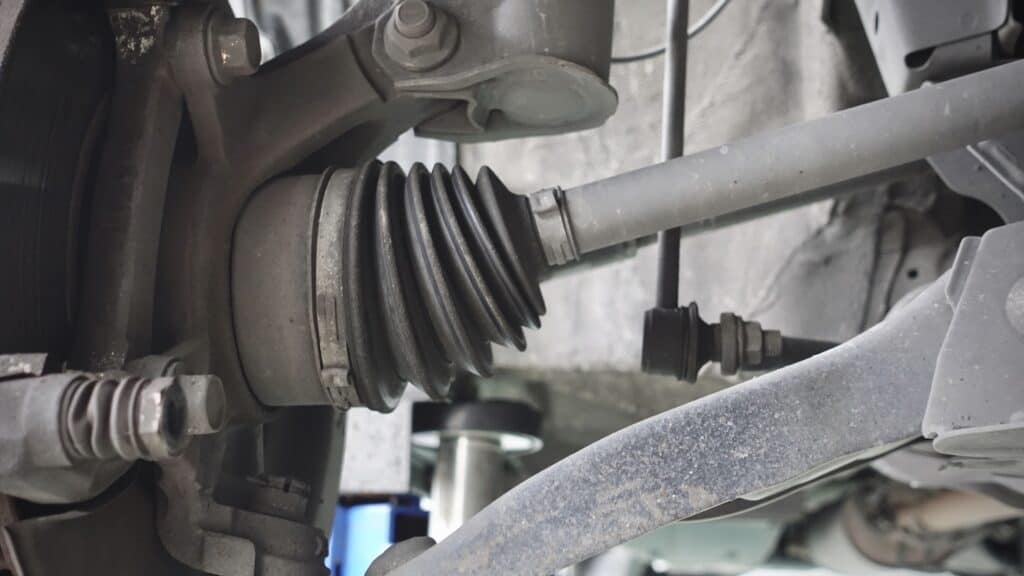
If you don’t take care of worn CV joints, thur ride feel bumpy and your car might use more fuel. If the wear is really bad, it could even make the wheel come off. Ignoring this issue can make things worsey can harm important parts of your car over time. The grinding noise happens because the CV joints are worn. If a CV joint is damaged, it could make you lose control of your car. It’s important to address this issue to keep your car running smoothly and safely.
Damaged or loose engine/motor mounts
If you notice a grinding sound when you accelerate, it might be due to an issue with your engine mount. This typically happens when the motor mount has moved or become unattached, causing the engine to shift around inside the engine bay.
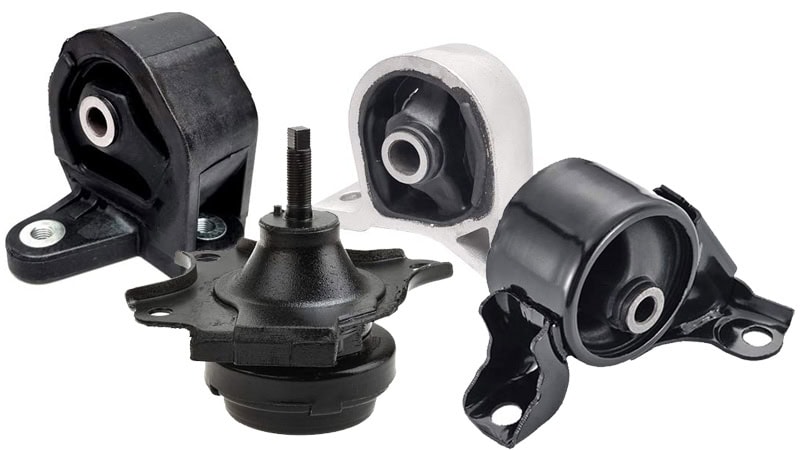
When a motor mount is loose or unattached, it can also affect your car’s serpentine belt. This can lead to additional damage as the belt rubs against the underside of the car’s swirl pot hose.
An engine that is not securely in place due to a loose or detached mount can rest on and damage other components, resulting in potentially costly repairs. It’s important to address this issue promptly to prevent further damage to your vehicle.
Solution Noises During Acceleration while drive
To effectively tackle the issue of unusual noises while accelerating at low speeds, it’s essential to pinpoint and resolve the root cause. For engine-related noises, consider opting for higher-quality fuel and addressing any pre-ignition issues. Transmission noises can often be mitigated by a timely change of transmission fluid. Additionally, brake noises might be alleviated by replacing worn brake pads.
Proactive maintenance plays a pivotal role in preventing these problems. Neglecting regular maintenance can lead to various issues in modern cars. To maintain your vehicle’s optimal performance, adhere to the manufacturer’s recommended service schedule. Timely changes of engine oil, brake fluid, transmission fluid, and coolant are imperative.
Tire maintenance is equally crucial. Ensure your tires are adequately inflated, as incorrect tire pressure can contribute to road noise and impact overall vehicle performance.
Beyond routine maintenance, timely repairs and part replacements are vital for preventing unwanted noises and ensuring the longevity of your vehicle. Regular visual inspections can help identify worn or damaged components before they escalate into more significant problems. Keep a close eye on critical elements such as brake pads, belts, and other susceptible parts.
Choosing a reputable service shop staffed with experienced mechanics is paramount. Regular visits to such establishments enable professional technicians to detect potential issues before they manifest. Skilled mechanics can identify loose or deteriorating parts that may require replacement, preventing cascading effects on other components.
In essence, a combination of regular maintenance, timely repairs, and professional oversight will not only address existing noises during acceleration but also contribute to a smoother, quieter, and more reliable driving experience
Determining the Potential Repair Costs
The cost of repairs hinges on the specific components requiring attention and the extent of damage caused by the malfunctioning part.
For transmission concerns, a basic solution like a transmission flush and fluid replacement might range from $120 to $280. However, if confronted with a transmission emitting a whining noise during acceleration, the repair cost could surge significantly. Depending on the severity of the issue, a transmission repair could cost anywhere from $1000 to $1600, while a complete replacement might reach up to $3800.
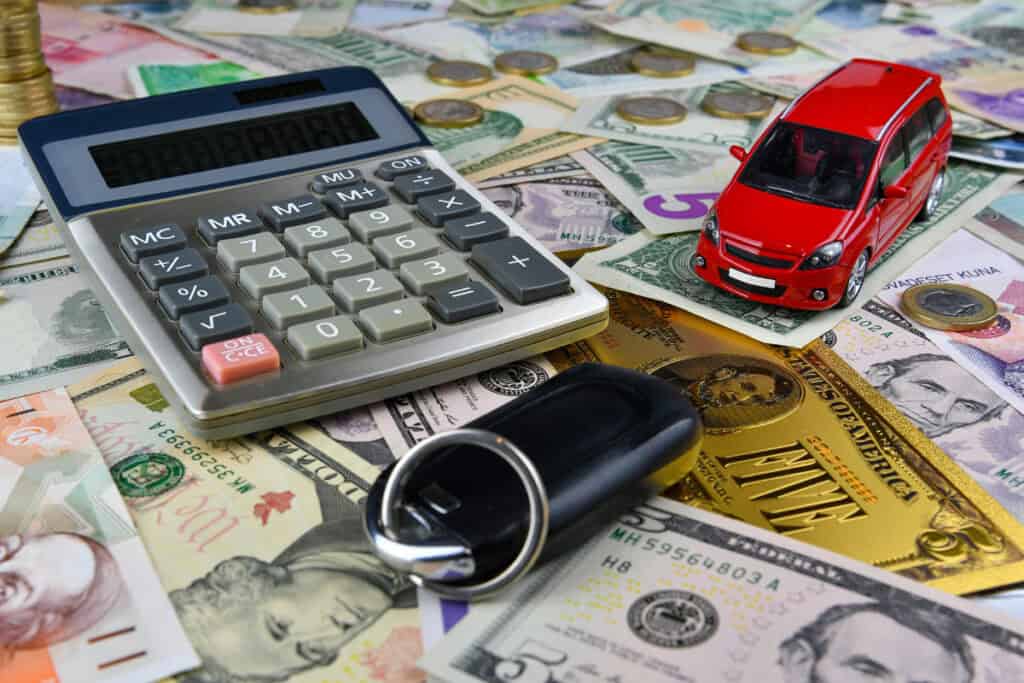
Addressing problems with rear or front differentials may cost between $250 and $900, with replacements potentially reaching up to $1700.
In the case of CV joint repairs, replacing a single joint could range from $120 to $280 for parts alone, and with labor included, the total could climb to $850. Considering the likelihood of both joints requiring attention, doubling this cost is advisable.
Installing a new alternator, inclusive of parts, may fall between $180 and $380. When factoring in labor charges, the overall replacement cost can rise to $850.
Dealing with worn-out brakes introduces several variables. A brake pad replacement, for instance, could cost between $180 and $320 per axle (bearing in mind most vehicles have two axles). If your brakes are emitting a grinding noise, indicating extensive wear and necessitating rotor replacement, anticipate spending at least an additional $550.
Acquiring a new car starter might range from $90 to $370 in parts alone. However, factoring in labor costs could potentially elevate the total expense to as much as $1200.
Concerning the replacement of a water pump, the average cost is around $580. However, the final bill can vary based on your vehicle’s make and model, as well as the accessibility of the pump. A challenging access point may result in increased labor hours, subsequently leading to a higher repair cost.

